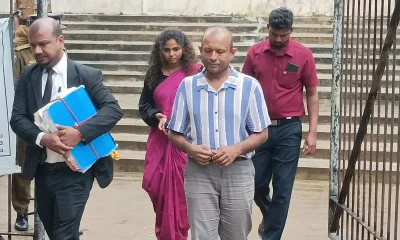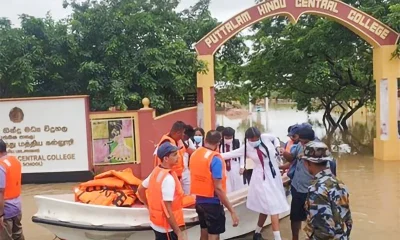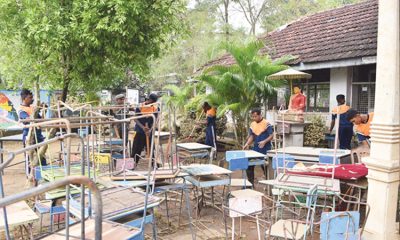Editorial
Govt. in a bind

Tuesday 12th April, 2022
Former President Maithripala Sirisena, of all people, has undertaken to bring order out of chaos; he is proffering advice to the government on how to resolve the present crises. He has presented a set of proposals to President Gotabaya Rajapaksa, spelling out how his party, the SLFP, and the rebel SLPP MPs think the government should set about the task. Protesters out there in the streets say nasty things about President Rajapaksa, but nothing must be more humiliating to him than to be told by a failed predecessor how to do his job! Most of all, Sirisena wants Prime Minister Mahinda Rajapaksa to resign. This is an interesting development.
In October 2018, Sirisena, as the President, in a bid to settle political scores with the UNP, appointed Mahinda as Prime Minister unconstitutionally, and even sought to dissolve Parliament when they could not muster a working majority in the House. Sirisena fought on, despite public protests, until the Supreme Court declared his action unconstitutional. Today, the SLFP is asking Mahinda to step down as the Prime Minister although the government insists it has a parliamentary majority!
Contradictory as Sirisena’s policies may be, the fact remains that pressure is mounting on the entire government to resign, and since the President has refused to give in, on the grounds that he was duly elected by the people, and could be removed only through constitutionally stipulated means, it looks as though the PM were left with no alternative but to sacrifice his position if he is to assuage public anger.
Prime Minister Rajapaksa is in this predicament because he did not put his foot down at the right time. He sought to further the interests of his family at the expense of the country. It has now been revealed that Sri Lanka found itself in a similar economic crisis in 2009 during the war, under Mahinda’s presidency, but the Central Bank and the Finance Ministry were given a free hand to tackle it, and they straightened up the economy in such a way that the public hardly felt the ill-effects of the economic downturn. If PM Rajapaksa had allowed the aforesaid institutions to do what had to be done when the present economic crisis began manifesting itself, the country would not have been on the verge of bankruptcy with the people taking to the streets in a bid to topple the government. Instead, Mahinda took on board the wrong advice, let the grass grow under his feet, and, worse, chose to make his younger brother, Basil, happy by handing over the Finance Ministry to the latter. As an experienced political leader, he should have known better. His family, which he thought was his strength, has become his undoing; today, he has protesters at the gate, demanding his ouster. He addressed the nation yesterday, and pledged to tackle the crises, but it is doubtful whether the irate public will take his promises seriously.
The government is still working under the delusion that the ‘Avant-garde’ tactics will help stem the tide of public resentment. An attack on a group of anti-government protesters has been reported from Kurunegala. This is exactly how the previous Rajapaksa government sought to suppress dissent, but in vain. It deployed goon squads, which operated alongside the riot police to crush Opposition protests. It does not seem to have learnt from its blunders.
It is a huge mistake for the government to have launched a counterattack in the form of pro-SLPP demonstrations, which have already led to the ruling party supporters clashing with anti-government activists in some areas. Every political party has a right to stage peaceful demonstrations, but the course of action the government has adopted in a bid to neutralise dissent, instead of solving the problems that have driven the people to protest, will only provoke the public further, and worsen political instability, which will put paid to efforts being made to resuscitate the economy.
No government is equal to the task of suppressing people power, which is the political version of a tsunami, and the only way the beleaguered SLPP regime could try to avert disaster is to mend its ways and make a serious effort to de-escalate the conflict.
Editorial
“Smell of Power”

Monday 15th December, 2025
The government hurriedly launched a social media campaign on Friday to gain political mileage out of the arrest of NPP MP Asoka Ranwala involved in a road accident. Its propagandists boasted that the rule of law had been restored, and everyone was now equal before the law. But they were left red-faced when Ranwala was granted bail soon afterwards. Worse, it was revealed that the police had not made Ranwala undergo an alcohol test immediately after the accident on Thursday night and waited until Friday noon to do so.
An otherwise articulate Police Spokesman ASP F.U. Wootler cut a pathetic figure when journalists asked him why no alcohol test had been conducted on former Speaker Ranwala immediately after the accident to determine whether he was drunk. The police have trotted out some lame excuses for dragging their feet. Thanks to their subservience to the ruling party, the police always have to defend the indefensible whenever a government politician commits a transgression.
An infant, his mother and grandmother were injured in Thursday’s crash. While the police are drawing heavy fire for the despicable delay in arresting Ranwala and making him take a blood alcohol test, the victims’ family members are demanding justice. JVP/NPP politicians are making various statements and pledges in a bid to obfuscate the issue and mislead the public, but to no avail.
The unfolding Ranwala drama, as it were, reminds us of an accident involving a JVP heavyweight during the Yahapalana government in 2016. JVP MP Vijitha Herath was arrested over a road accident where his vehicle went out of control and crashed into a wayside telephone post. He was subsequently released on police bail. The Judicial Medical Officer reportedly mentioned in his report that Herath had been smelling of liquor at the time of examination. However, the Colombo Additional Magistrate acquitted Herath of the drunk-driving charge in keeping with a legal precedent, but ordered him to pay Rs. 1,500 as state costs. Herath was also ordered to pay Rs. 17,400 for the damaged telephone post. Herath vehemently denied that he had consumed alcohol. The JVP was a partner of the Yahapalana government, in all but name.
Is it that the politicians in power and their kith and kin never drive under the influence of liquor and they only drive while ‘smelling of liquor’! The police ignore that smell. They take alcohol tests, if at all, hours after causing accidents! There are allegations of blood and urine samples being swapped to help the politically-connected suspects evade drunk-driving charges.
The JVP-led NPP has demonstrated that it has no qualms about interfering with the legal process to let its members off the hook in spite of its moral grandstanding and pledges to restore the rule of law. Head of the Retired Police Collective of the JVP/NPP, former Senior DIG Ravi Seneviratne, arrested for causing a multiple vehicle collision under the influence of alcohol in Colombo in 2023, had the drunk driving charge against him dropped after his elevation to the current position. The Police Department is currently under him; a fish is said to rot from the head down.
President Anura Kumara Dissanayake has taken upon himself the unenviable task of mitigating the adverse political impacts of his MPs’ endless blunders and transgressions. It has become a Sisyphean ordeal for him. Now, he will have to rush to Parliament again and try to control the political damage the controversy over Ranwala’s accident has caused to the government. He has to make damage-control speeches at such a rate that while sprinting into Parliament for that purpose, he might collide with himself coming out, as in a cartoon.
Upon witnessing the blatant manipulation of the legal process and the subversion of the ideals of equality and justice under the current dispensation, one wonders why JVP/NPP does not adopt the credo of the pigs in Orwell’s Animal Farm and declare that all Sri Lankans are equal, but those who are JVP/NPP members are more equal than others.
Editorial
Disaster relief and shocking allegations

The government has announced a sweeping compensation package for the Ditwah disaster victims, and the disbursement of money for cleaning the flood-affected houses, is already underway. It is spending funds that belong to the people and not the JVP or the NPP. It must therefore not only disburse state funds responsibly but also be seen to be doing so. Transparency is the most potent antidote to all forms of financial malpractice. Worryingly, complaints abound that government politicians are interfering with relief distribution operations and even diverting funds for the benefit of their supporters.
Sri Lanka United Grama Niladhari Association (SLUGNA) President Nandana Ranasinghe told the media on Monday (08) that JVP/NPP politicians and their supporters were meddling with the ongoing disaster relief programmes at all levels and even obstructing the Grama Niladharis (GNs). He claimed that the political authority had sent letters to the District and Divisional Secretaries, directing them to appoint ruling party members to the state-run welfare centres. SLUGNA Secretary Jagath Chandralal said state officials had been directed to obtain approval from the government members of the Prajashakthi committees for carrying out relief work. On Thursday, addressing the media, Convenor of the Sri Lanka Grama Niladhari Association Sumith Kodikara made a number of similar allegations. He said the NPP politicians were arbitrarily helping their supporters obtain Rs. 25,000 each as compensation. He stressed that only the disaster victims had to be paid compensation, and never had relief programmes been politicised in that manner. These allegations are shocking enough to warrant probes.
Those who are misusing state funds allocated for disaster relief must be arrested and prosecuted under the Offences against Public Property Act. Some Opposition politicians and their family members have been jailed for obtaining fuel allowances fraudulently while in power. So, the offence of misusing funds meant for disaster victims must not go unpunished.
A ruling party politician, in his wisdom, once claimed that all 159 NPP MPs were of the same calibre as the late Foreign Minister Lakshman Kadirgamar. He caused a posthumous affront to Sri Lanka’s nonpareil statesman, whose presence adorned national politics. His egoistic, lofty claim drew derision. However, the government politicians ought to take cognisance of something Kadirgamar said in answer to a question from a BBC journalist about alleged irregularities in the handling of tsunami relief in early 2005. He said that wherever humans and money happened to be together, there was the possibility of corruption, but the then government was doing everything in its power to prevent irregularities in tsunami relief distribution. No truer words can be said about humans and their greed, especially in this country, where some corrupt politicians and officials have stooped so low as to enrich themselves by procuring fake cancer drugs.
No relief or welfare programmes have been devoid of politics in this country. It may be recalled that one of the factors that led to the country’s bankruptcy in 2022 was a politically motivated pandemic relief programme, aimed at enabling the SLPP to garner favour with the public and win the 2020 general election. The interim SLPP government gave away state funds at the rate of Rs. 5,000 per family besides distributing baskets of goods. It won the parliamentary election that followed, but the mismanagement of state funds and the loss of revenue due to ill-conceived tax and tariff reductions had a crippling impact on the economy. One can only hope that there is no truth in the allegation that the NPP government is using the ongoing relief operations to shore up its approval rating and electoral prospects in view of the Provincial Council elections expected next year. Strangely, President Anura Kumara Dissanayake, while announcing the compensation package in Parliament, declared that the families who had suffered even minimal damage to their houses, such the loss of a single roofing sheet, would receive as much as Rs. 1 million as compensation! Sri Lankan politicians are very generous with state funds.
The success of relief and rebuilding programmes hinges on several prerequisites, including transparent allocation of resources, proper coordination, efficient delivery systems, accountability and monitoring, and sustainability and follow-up. No room must be left for partisan politics and the agendas of political parties where relief and rebuilding programmes are concerned.
Editorial
A single swallow wheeling in a gyre

Saturday 13th December, 2025
NPP MP and former Speaker Asoka Ranwala was arrested yesterday over a road accident, where an infant and two women were injured, in Sapugaskanda. He has been charged with dangerous driving and failure to prevent an accident, according to media reports quoting the police. He was in the National Hospital of Sri Lanka, Colombo, at the time of going to press. An attempt is being made in some quarters to have the public believe that the law applies to everyone equally under the current dispensation, but it is said that one swallow does not make a summer.
The police have apparently acted the way they should, where the accident allegedly caused by Ranwala is concerned, but they ought to explain why they baulked at arresting a deputy minister and an NPP mayor facing a fraud charge, and went out of their way to consult the Attorney General instead to buy time. They swiftly arrest Opposition politicians and haul them before courts in double-quick time, don’t they?
One may recall that former Senior DIG Ravi Seneviratne was arrested in 2023 for drunk driving and causing a multiple vehicle collision in Colombo. Thereafter, he joined the NPP’s Retired Police Collective as its head, and had himself appointed Secretary to the Ministry of Public Security, after the NPP’s rise to power, the following year. Now, the drunk driving charge against him has been dropped, according to media reports! This is proof that political interference with the Attorney General’s Department is far from over, and the rule of law is yet to be restored. The police remain putty in the hands of the ruling party politicians, and the Executive is keeping the AG’s Department under his thumb.
Hundreds of JVP supporters broke their journey on the Southern Expressway, of all places, on their way to their party’s May Day rally this year. Several buses carrying them were seen parked in undesignated areas of the expressway in full view of the police. It will be interesting to know if the police have prosecuted those offenders.
The national anti-graft commission and the CID have come under criticism for dragging their feet on complaints against the NPP politicians and their cronies while going hell for leather to arrest and prosecute the political rivals of the current administration. No government politician has been questioned on the controversial release of 323 red-flagged containers via the green channel in the Colombo Port in January 2025. What those containers carried is anybody’s guess.
In September, a group of JVP activists stormed a Frontline Socialist Party (FSP) office in Yakkala. The police shamelessly sided with the JVP members, who produced a document, claiming that it was a court order, vesting the place in their party. The police accepted their claim unquestioningly and drove the FSP members away. They went on to put up barricades in the area to prevent the FSP from trying to reclaim their office seized by the JVP. We argued in a previous editorial comment that it was a clear instance of the police misusing state resources to safeguard the interests of the government.
A few days later, Gampaha Additional Magistrate Dhammika Uduwe Withana directed the Yakkala Police to evict all those who were occupying the FSP office and to hold the premises under police custody pending the Gampaha District Court ruling on its ownership.
One should not be so naïve as to take the wheeling of a single swallow in a gyre as a sign of the arrival of summer.
-

 Features6 days ago
Features6 days agoFinally, Mahinda Yapa sets the record straight
-

 News7 days ago
News7 days agoCyclone Ditwah leaves Sri Lanka’s biodiversity in ruins: Top scientist warns of unseen ecological disaster
-

 Features6 days ago
Features6 days agoHandunnetti and Colonial Shackles of English in Sri Lanka
-

 Business4 days ago
Business4 days agoCabinet approves establishment of two 50 MW wind power stations in Mullikulum, Mannar region
-

 News5 days ago
News5 days agoGota ordered to give court evidence of life threats
-

 Features7 days ago
Features7 days agoAn awakening: Revisiting education policy after Cyclone Ditwah
-

 Features5 days ago
Features5 days agoCliff and Hank recreate golden era of ‘The Young Ones’
-

 Opinion6 days ago
Opinion6 days agoA national post-cyclone reflection period?













